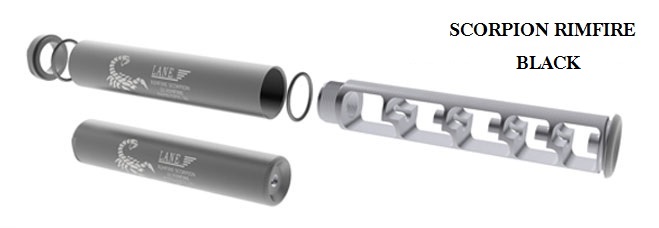

This is by far the most common question asked by the average Joe and is very hard to answer in one sentence because there can be so many potential benefits. I have compiled a list of benefits that I have personally experienced but it probably doesn't cover even half of them.
1. Sound reduction. According to government safety protocols, any sound pressure wave exceeding 140Db will cause permanent hearing damage that cannot be repaired. Generally speaking a firearm will generate between 145db to over 170db including rim-fire calibers. With our suppressors most large calibers are reduced down to 128-136db with subsonic calibers down to as low as 110db which is quieter than a hand clap.
2. Recoil reduction. Especially on magnum caliber rifles this is a huge advantage. In my experience, felt recoil with a suppressor far surpasses felt recoil with a muzzle brake and it gets quieter instead of louder. Customers have claimed their 300win mag or 300 wthrby mag feel like shooting a 223 or at most a 243. Now those customers complain about spending so much on ammunition because it's so much more fun to shoot, and they are firing a lot more rounds.
3. Accuracy increase. Suppressors generally increase accuracy for two main reasons. First, the suppressor holds the gasses back not letting nearly as much turbulent gas pass the bullet when exiting the bore (which is why a good crown on an unsuppressed gun is so important for accuracy). Second, because of the recoil and sound reduction, the shooter is much more capable of holding a steady shot without subconsciously anticipating the large recoil and noise that is coming when he pulls the trigger.
4. Getting multiple shots or multiple animals while hunting. The main noise made by a suppressed high-powered firearm is the sonic boom made by the bullet exceeding the speed of sound. Most people have heard a sonic boom when playing with an Indiana Jones whip as a kid. The snap of a whip is actually the tip of the whip passing the speed of sound and it sounds much like a supersonic bullet in flight. The sonic boom is actually a sound wave that is following the bullet at the speed of sound and bouncing off of objects like the ground or trees or buildings. The actual sound of a sonic boom has no discernible direction, so when your firing at a game animal, the animal itself or other animals around it that hear the sonic boom have no idea which direction or how close the the noise came from. In most cases when firing at 100+ yards, if you wound or miss the animal it will stand there and look around trying to figure out what just happened. In many cases, especially with coyotes, the animal will actually run towards you thinking to escape danger. This phenomenon is especially noticeable when prairie dog hunting. Generally, if a prairie dog doesn't see or hear the bullet impact the dirt, you will usually get another shot.
A silencer is an NFA item that does require approval by the ATF to change ownership. The good news is that it's actually pretty easy to do (about as difficult as getting a concealed weapons permit). If you come in to see us, we can have the transfer paperwork (Form 4) done in 20-30 minutes. We will build you a gun trust, do fingerpints and photo, and have the forms in the mail the same day or the next at no extra charge. You do have to be a South Dakota resident for us to do the paperwork. If you live out of state you can go through one of our many dealers or you can buy direct and we can transfer through any CLASS III dealer near you. If you have questions about this process you can always give us a call and we will walk you through the process.
Because of the high volume of transfers going through today, once the Form 4 is sent to the ATF it usually takes 6-8 months for approval. This time frame seems to fluctuate with the number of transfers being done is the United States and the number of ATF examiners employed. This time frame is as of November 2020.
ABSOLUTELY NOT! I have read the entire ATF National Firearms Act Handbook and have found nothing to indicate that owning a silencer will waive your rights to anything. I believe this rumor was started by a statement in the ATF National Firearms Act Handbook that states that a licensee waives his rights to search and seizure on the licensees premises. This pertains only to the federal firearms license (FFL) holder and only on their place of business. It basically states that being a firearms dealer allows the ATF to come onto my business premises without a warrant and has nothing to do with citizens owning suppressors.
NFA stands for the National Firearms Act enacted in 1934. It encompasses the regulations of items such as silencers, short barreled rifles, short barreled shotguns, and machine guns.
The ATF charges a $200 one time tax for an NFA transfer. This applies to each NFA item you buy, so if you buy three silencers you will have to pay $600 in tax.When a transfer is approved there is a $200 stamp attached to your approved transfer form (Form 4) to show you have paid the tax hence the term "tax stamp". This tax has been in place since 1934 to try to discourage the purchase of machine guns, short barreled rifles, short barreled shotguns, and silencers.